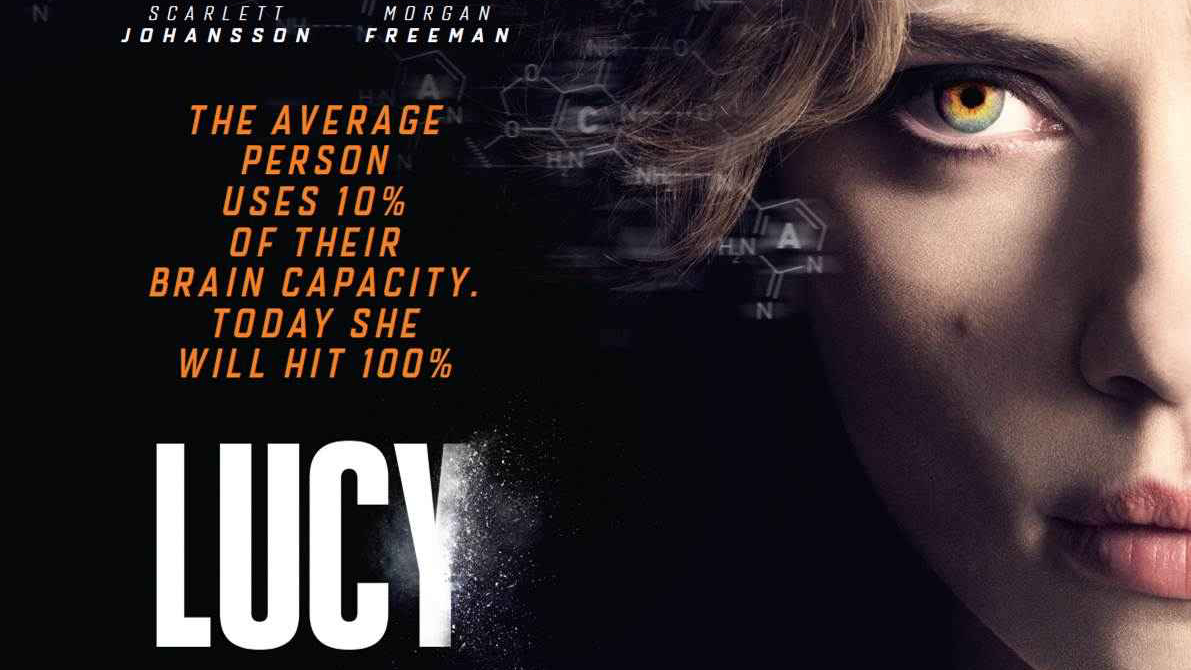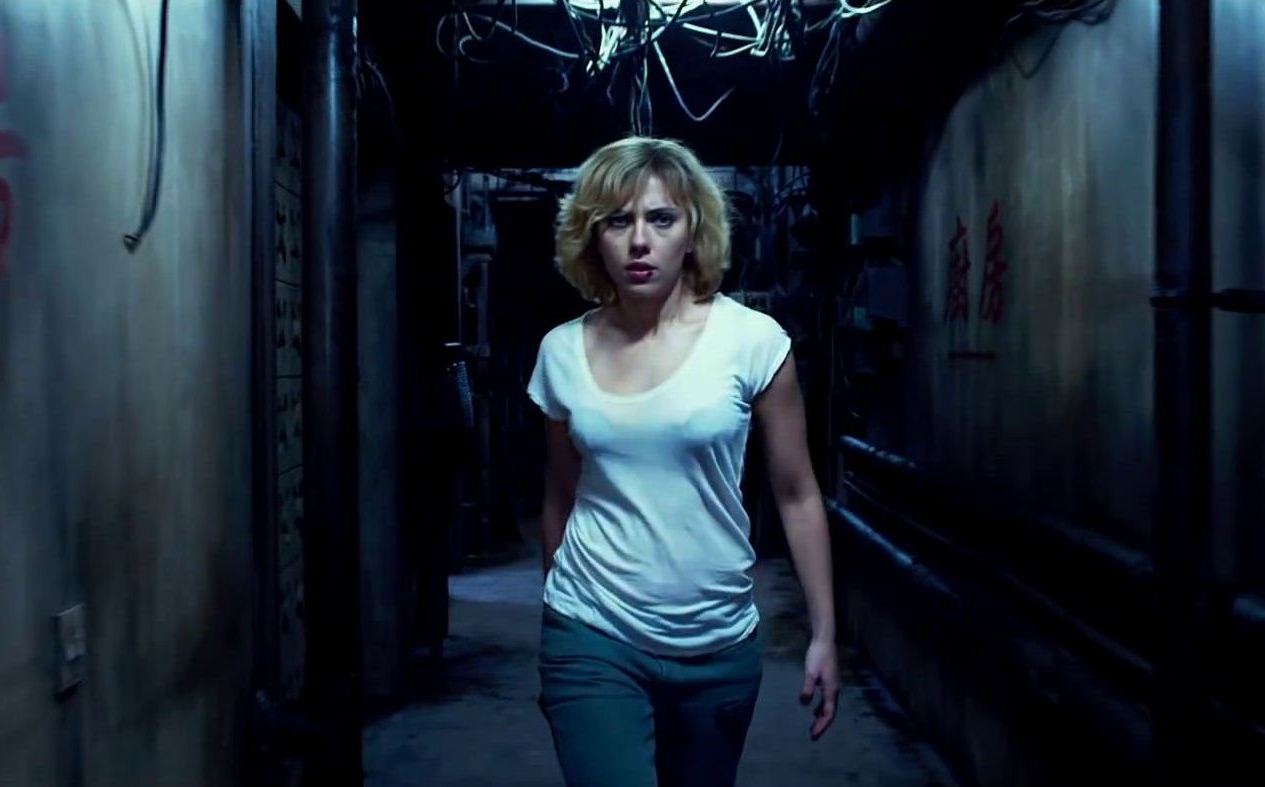Lucy (2014)

Lucy (2014): A Thrilling Dive into the Limits of Human Potential
Luc Besson’s Lucy (2014) is an ambitious sci-fi action film that explores the untapped potential of the human brain. Starring Scarlett Johansson in the titular role, the film combines explosive action, philosophical musings, and stunning visuals to deliver a cinematic experience that is as thought-provoking as it is entertaining. While it ventures into speculative science, the movie’s sleek execution and powerful lead performance make it a standout in the genre.
The Plot: From Ordinary to Extraordinary
The story begins with Lucy, a young woman living in Taipei, who is coerced into delivering a mysterious briefcase to a powerful drug lord, Mr. Jang (Choi Min-sik). Unknowingly, she becomes a drug mule for a synthetic substance called CPH4. When the drug accidentally leaks into her system, Lucy’s brain capacity starts to expand exponentially, granting her superhuman abilities such as telekinesis, telepathy, and control over matter.
As Lucy’s cognitive abilities grow, she seeks out Professor Norman (Morgan Freeman), a renowned neuroscientist, to understand her transformation. Meanwhile, she is pursued by the ruthless Mr. Jang, who wants his drug back. The film evolves into a fast-paced journey of survival, self-discovery, and exploration of the nature of existence.
Scarlett Johansson: A Commanding Performance
Scarlett Johansson carries the film with a magnetic performance, seamlessly transitioning from a terrified young woman to an emotionless, god-like being. Her portrayal captures Lucy’s physical and emotional transformation, making her a compelling protagonist. Johansson’s ability to convey the overwhelming power and alienation Lucy experiences is central to the film’s impact.
Themes: Exploring Human Potential
At its core, Lucy is a speculative exploration of what might happen if humans could access 100% of their brain capacity. While the concept is rooted in a debunked myth, the film uses it as a launching pad to delve into themes of intelligence, evolution, and the purpose of existence. Lucy’s journey from a helpless individual to a being of pure energy prompts philosophical questions about the meaning of life and the limits of human potential.
The movie also reflects on the dangers of unchecked power. As Lucy becomes increasingly omnipotent, she loses touch with her humanity, highlighting the delicate balance between knowledge and emotion.
Action and Visuals: A Spectacle of Evolution
Luc Besson, known for his visually rich storytelling, delivers a film that is as visually stimulating as it is narratively ambitious. The action sequences are exhilarating, blending martial arts, gunfights, and mind-bending displays of Lucy’s powers. One standout scene features Lucy telekinetically dismantling an entire squad of armed men, showcasing her dominance in a stunning display of CGI.
The film’s visual style evolves alongside Lucy’s transformation. Early scenes are grounded in gritty realism, but as Lucy’s powers grow, the visuals become more abstract and cosmic. The final act is a dazzling montage of time, space, and evolution, culminating in a moment that feels both profound and overwhelming.
Morgan Freeman: The Voice of Reason
Morgan Freeman adds gravitas to the film as Professor Norman. Serving as the audience’s guide through the scientific and philosophical implications of Lucy’s transformation, Freeman’s performance grounds the film, providing a sense of realism amid the fantastical elements. His character’s discussions about brain capacity and evolution help frame the narrative, even if the science is more fiction than fact.
Criticism: Style Over Substance?
While Lucy is undeniably stylish and ambitious, it has its share of criticisms. The film’s reliance on the “10% brain myth” as a central premise has been widely criticized by scientists and skeptics. Additionally, some viewers may find the philosophical musings overly abstract or heavy-handed.
The pacing is another point of contention. At a brisk 89 minutes, the film hurtles through its plot, leaving little room for deeper character development or exploration of its ideas. This breakneck speed may leave some viewers craving a more measured approach.
Luc Besson’s Vision: A Bold Experiment
Luc Besson’s direction is unapologetically bold, blending elements of action, sci-fi, and philosophical drama. His ability to balance high-octane sequences with introspective moments is commendable, even if the film occasionally prioritizes spectacle over depth. Lucy reflects Besson’s signature style: a mix of sharp visuals, strong female leads, and larger-than-life storytelling.
Impact and Legacy
Lucy stands out as a unique entry in the sci-fi genre, offering a mix of entertainment and introspection. It challenges viewers to think beyond the confines of their own existence while delivering a thrilling cinematic experience. Despite its scientific inaccuracies, the film resonates as a story about evolution, potential, and the human quest for meaning.
The movie’s success, grossing over $460 million worldwide on a $40 million budget, underscores its broad appeal. It has inspired discussions about intelligence, neuroscience, and the possibilities of human advancement, even if those discussions lean more toward fiction than fact.
Conclusion: A Sci-Fi Thrill Ride with Philosophical Undertones
Lucy is a film that dares to be different, pushing the boundaries of sci-fi storytelling. Scarlett Johansson’s captivating performance, combined with Luc Besson’s visionary direction, results in a movie that is as entertaining as it is thought-provoking. While it may not satisfy those seeking scientific rigor or traditional storytelling, it offers a unique and exhilarating journey into the unknown.
For those willing to suspend disbelief and embrace its ambitious vision, Lucy is a film that lingers in the mind long after the credits roll.
Key Takeaways
- Innovative Concept: The film explores the speculative idea of unlocking 100% of the brain’s potential, despite its scientific inaccuracies.
- Stunning Visuals: Luc Besson delivers a visually spectacular experience, especially in the film’s cosmic finale.
- Scarlett Johansson Shines: Johansson’s performance anchors the film, capturing both the power and isolation of Lucy’s transformation.
- Philosophical Undertones: The movie delves into themes of evolution, intelligence, and existence, sparking discussion and debate.
- Fast-Paced Thrills: Action-packed and briskly paced, the film offers non-stop entertainment.
#LucyMovie #ScarlettJohansson #LucBesson #SciFiThriller #HumanPotential #2014Movies











